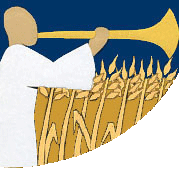 |

|

|
De schriften onderwijzen ons dat man en vrouw gelijk zijn in Gods ogen.
Het is moeilijk te begrijpen hoe die lering in overeenstemming kan zijn
met het uitsluiten van het priesterschapsambt voor vrouwen, net zo moeilijk
als het is om te begrijpen hoe de priesterschapsban voor zwarten tot 1978
in overeenstemming kon zijn met de lering dat zwart en blank gelijk zijn
in Gods ogen (2 Nephi 26:33). Beweringen dat
mannnen en vrouwen "gelijke maar aanvullende" rollen vervullen",
klinken verdacht veel op de "apart maar gelijk' rethoriek waarvan
men zich plachtte te bedienen om racisme te rechtvaardigen. I.v.m. de
omstandigheid dat vrouwen priesterschapshandelingen verichten bij tempelverordeningen,
is het niet duidelijk waarom zij dit niet zouden kunnen doen op andere
terreinen van kerkelijke bediening. Bovendien zegenden en zalfden Mormoonse
vrouwen de zieken gedurende de 19e eeuw.
Het tot het priesterschapsambt te wijden van vrouwen en meisjes zou een
heel nieuw begrip m.b.t.'geslacht'vereisen onder heiligen der laatste
dagen, misschien zelfs een nieuw begrip van het priesterschap als zodanig.
Onduidelijk is of de Heiligen eenmaal nieuw licht aangaande dit onderwerp
zullen ontvangen. Een eerste stap zou kunnen zijn om het priesterschap
niet zozeer te zien als autoriteit aan een individueel lid verleend, maar
als een gave aan de kerk als geheel verleend. De herstelling van het priesterschap
was een collectieve opdracht om Gods werk te verrichten. Alle leden, zowel
mannen als vrouwen, zijn met macht bekleed om priesterschapsverordeningen
te bedienen; de doop, de bevestiging, de begiftiging. Priesterschapsambten
maken deel uit van een divers scala aan mogelijkheden die Heiligen der
Laatste dagen in hun roeping kunnen gebruiken teneinde hun geestelijke
gaven anderen tot zegen te kunnen laten zijn (LV
46: 15-16).
| Aanverwante Onderwerpen:
|
 Geinspireerde
Zegens Geinspireerde
Zegens |
|
|
Eliza R. Snow: Is it
necessary for sisters to be set apart to officiate in the sacred ordinances
of washing, anointing, and laying on of hands in administering to
the sick? . . . It certainly is not. Any and all sisters who honor
their holy endowments, not only have the right, but should feel it
a duty whenever called upon to administer to our sisters in these
ordinances, which God has graciously committed to His daughters as
well to His sons; and we testify that when administered and received
in faith and humility they are accompanied with all mighty power.
Inasmuch as God our Father has revealed these sacred ordinances and
committed them to His saints, it is not only our privilege but our
imperative duty to apply them for the relief of human suffering.
|
Woman's Exponent,
Sept. 15, 1884, 61; quoted in Linda King Newell, "A Gift Given,
A Gift Taken:
Washing, Anointing, and Blessing the Sick among Mormon
Women," The New Mormon History
(Salt Lake City: Signature
Books, 1992), 105 |
Bathsheba W. Smith:
I never like to hear a sermon without hearing something of the Prophet,
for he gave us everything, every order of the priesthood. He said
he had given the sisters instructions that they could administer
to the sick and he wanted to make us, as the women were in Paul's
day, "A kingdom of priestesses."
|
Pioneer Stake Relief Society
Minutes, June 9, 1905; quoted in D. Michael Quinn, "Mormon Women
Have
Had the Priesthood Since 1843," Women and Authority
(Salt Lake City: Signature Books, 1992), 369 |
John A. Widtsoe: Paul
the Apostle, speaking in an earlier day said that "neither
is the man without the woman, neither the woman without the man,
in the Lord." (1 Cor. 11:11.) This notable statement implies
that woman . . . bears joint responsibility with the man in establishing
the Kingdom of God; and, that the work will fail unless both do
their duty. . . . There can be no question in the Church about man's
rights versus woman's rights. They have the same rights.
|
| Relief Society Magazine,
June-July 1943, 372 |
Eldred G. Smith: If
service is the work of God, and if we are to become as he is and
return to live with him in his kingdom, our work must be to serve
others. There are many ways to serve. Every activity of the Church
provides an opportunity to serve—priesthood, Relief Society,
genealogy, the paying of tithes; all of the auxiliary organizations
are mediums through which we may serve.
|
| Conference Report,
April 1967, 78 |
Ardeth Greene Kapp:
If we were to begin with the time a child is given a name and a
blessing and then continue on through baptism, confirmation, the
sacrament, callings and being set apart, patriarchal blessings,
administrations, the endowment, and finally celestial marriage,
we would quickly realize that all the saving blessings of the priesthood
are for everyone, male and female.
|
| My Neighbor, My Sister, My Friend (Salt Lake City: Deseret Book, 1990), 75-76 |
Chieko N. Okazaki:
Priesthood isn't a matter of who's in charge and who gets to give
orders. It's a matter of serving others. Every officer and every
member, whether man or woman or child, needs that feeling of
being sustained, both by members who hold the priesthood and by
those who do not, so that all the members, men and women,
can be strengthened.
|
| Disciples (Salt
Lake City: Deseret Book, 1998), 65 |
|

|
 |
